Message from Dr. Ricardo Low
WCTF Board Member
Director of WCTF-Argentina
Buenos
Aires, February 23, 2001
Imagine
a large, empty room in an old warehouse where, in one corner, a small,
makeshift Catholic chapel has been erected. The room is serene. "This
is our 'ecumenical' room," said Dr. Horacio Aziz, Pittsburgh-trained transplant
hepatologist and director of the Argentine Transplant Foundation. He extends
his hand in the direction of the vast, dark space and imagines the future.
"We want the families of our transplantees to set up chapels to their
own faiths here when they become our guests. We want this to be a place
of solace, of peace, of spiritual comfort--for every member of the transplantees'
families, who are far from their homes, as they wait for the operation
of their loved one to take place."
Indeed,
there is plenty of empty space for other such places of worship to be
set up in this room. Donated by the state and furnished with donations
from individuals and companies, the warehouse that has become the "Transplant
Home" is efficiently run by Sister Gladys Percara with the able help of
Daniel Ponce--both of whom are liver transplantees. Despite the declining
availability of government aid for the foundation, Dr. Aziz accepts many
transplant patients even when they are unable to pay for their surgery,
and their families are never charged for room and board. He, Sister Gladys,
and Daniel Ponce are motivated by their faith in their mission, and they
continue their work with the help of donations from generous private sources.
The most recent of these sources is "Project Amela," funded by a small
group of private American donors whose efforts have been facilitated by
the World Children's Transplant Fund.
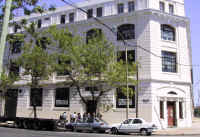
Argentine Transplant Foundation Home for Transplanted
Children and Families
(click image for a close-up)
WHY
WCTF?
WHY ARGENTINA?
Mark Kroeker,
founder and chairman of WCTF, met an 11-year-old girl in Bosnia three
years ago while stationed there as a deputy commissioner of the United
Nations International Police Task Force. Her name was Amela Kovacevic,
and she desperately needed a life-saving liver transplant which was impossible
to obtain in her own country. After his return to the States in 1999,
Mark mentioned Amela's plight at a WCTF board meeting. "WCTF is prohibited
by charter from funding individual cases" he reminded us, "but I have
given my word that I will help save this girl's life." And so, much as
he had eleven years earlier after meeting Veronica Arguello--the Argentine
girl who inspired the founding of WCTF (see "Message from the Founder"
on our home page for the story)--Mark set about raising the funds for
Amela's transplant on his own.
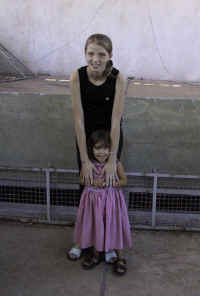
Amela
hugging her new Croatian/Argentine girlfriend
(click image for a close-up)
Several
weeks before I heard about Amela, I had a most interesting conversation
with Drs. Federico Villamil and Gustavo Podestá of the Favaloro Institute
here in Buenos Aires. I learned from them that the cost of a liver transplant
in Argentina is one-third the cost of a transplant in the United States,
and that the survival rate is as good in Argentina as in the best transplant
centers around the world. Specifically, their team has operated on 38
patients in the past four years, with a survival rate of 95%. So, I subsequently
suggested to Mark that he try to send Amela to Argentina for her operation.
The idea was unusual, perhaps even radical, at the time. But as the months
passed and sufficient funds for "Project Amela" were not forthcoming,
the idea of having Amela transplanted in Argentina became a more realistic
solution than attempting to accomplish the same thing in the United States.
While all of us at WCTF understood that "Project
Amela" was essentially
a private endeavor, we also recognized that the goal of helping her was
not at cross-purposes with WCTF's mission--not at all! It became very
clear to us that while private donors could help Amela get a new liver,
we could help the thousands of "Amelas" around the world by publicizing
her case. What better way to dramatize the need for pediatric transplantation
services in Bosnia and other developing countries than to show the world
Amela's odyssey from her Muslim village hours from Sarajevo, to Buenos
Aires? WCTF helps bring medical training, technology, and education to
third-world countries precisely in order to *avoid* the "export" of children
to the first world for life-saving organ transplant procedures. Thus,
as the plan developed to transplant Amela in Argentina, Mark, the WCTF
staff, myself, and an ever-growing number of dedicated volunteers committed
ourselves to coordinating the many details of the plan and publicizing
"Project Amela" to the press.
As we achieve success in our efforts, fewer and fewer children will
have to undergo arduous journeys like Amela's to save their lives. More
children will receive the specialized medical care they need--right in
their home country, and at a fraction of the cost in the U.S. Thus, a
dollar donated to the World Children's Transplant Fund translates into
many more valuable dollars and more transplants in the future. Think of
all the Amelas in Bosnia who were not fortunate enough to come to the
attention of Chief Kroeker. Think of all the sick children in other
countries whose chances of getting transplants at present are very slim
indeed. With centers in these countries like the ones WCTF has established
in Argentina and Costa Rica--where transplants are now part of mainstream
medical services--their chances of survival will increase exponentially.
Quite simply, many more children will live instead of die.
A related benefit of our work is the improvement in general health care
wherever there are transplant services. Once a hospital has this capability,
it can provide better care for all its patients. Transplant surgery is
good medicine, and the technology and training required for these relatively
rare procedures results in newer equipment, upgraded intensive care units,
and improved technical skills for doctors and nurses--simply better medicine
all around. We read about the survivors of transplants; but we do not
read about the other patients who would not have survived if transplant
technology and training had not been available at their hospitals.
BACK
TO AMELA'S ARGENTINA STORY...
Amela--now
14 years old--her mother Ferida, and her brother Jasmin arrived in Buenos
Aires on February 4, from Portland, Oregon, via Los Angeles. They were
welcomed with open arms by Dr. Aziz and his helpers as well as President
Natalio Marcovic and other members of the "Circulo Croata" (roughly translated,
Croatian Social Club), the Bosnian community here in Buenos Aires. Imagine
the family's reaction upon seeing Daniel Ponce, muscular and full of life,
with his liver surgery scar! And imagine their comfort and pleasure in
the company of their countrymen, with whom they communicated easily in
their native language. From that point forward, at least one member of
the club has been with the Kovacevics constantly to provide translation
and bridge the language barrier.
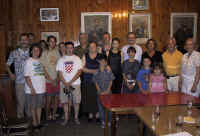
Amela
and her Croatian/Argentine benefactor volunteers
(click image for a close-up)
Natalio,
also an engineer at the Argentine Atomic Energy Commission, took us to
visit the club's meeting place. The first Croatian immigrants to Argentina
founded the club in 1926, when Argentina was a huge magnet for those starving
in Europe. The children of these immigrants have continued the Croatian
traditions, which include colorful dances with authentic costumes. The
picture of the Virgin of Croatia stared at us from the wall. And the love
for Amela and her Muslim family was quite evident in all the members of
the Circulo Croata. Their spiritual connection was so real and beautiful.
Amela looks so happy here in Buenos Aires!
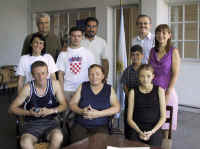
Amela
and her family with Sister Gladis Pertara (left), Doctor Horacio Aziz
(center back) of the Argentine Transplant Foundation Home, Mr. Natalio
Markovic (back right), President of the Croatian Club of Buenos Aires,
and other volunteers from the Home and the Croatian Community.
(click image for a close-up)
FAVALORO...
AND SURGERY!
Rene Favaloro
was a giant of Argentine medicine. He was well known for the invention
of the first heart bypass graft at the Cleveland Clinic, which revolutionized
heart surgery. At the peak of his success, he returned to his homeland
to realize his dream: a state-of-the-art health center.
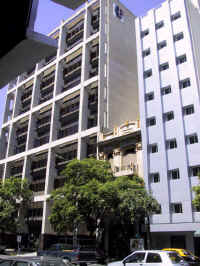
The
Favaloro Foundation Hospital in Buenos Aires
(click image for a close-up)
Walking
into the Favaloro Hospital in Buenos Aires is like entering any of the
most advanced medical centers in the world. Modern and technologically
efficient, one can see the quiet dedication in the faces of the staff.
Although there are several transplant centers in Argentina, the Favaloro
is one of the best--in fact, it is one of the best in the world. The Center
was built strictly with private donations in a country where donations
are by and large not tax deductible. While the technology is first-rate,
the patients are also given that special Latin affection, which is so
personal and warm. Everyone is made to feel at home.
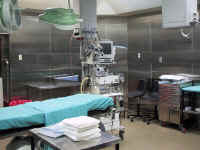
Operating
Room for Transplants at the Favaloro Foundation Hospital
(click image for a close-up)
When I met
again with Drs. Villamil and Podestá--who were trained in the United States
under WCTF auspices--they in turn pledged that they would continue WCTF's
mission by helping to train doctors in other developing countries. In
fact, the International Liver Transplant Society, of which Dr. Villamil
was elected president earlier this month, has pledged to help developing
countries train their doctors to do transplants in their own back yards,
so to speak, so that cases like Amela need never happen again.
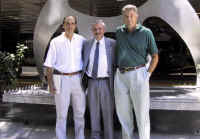
Doctor
Gustavo Podestá (trasplant surgeon, left) and Doctor Federico Villamil
(transplant hepatologist, right), with Doctor Richard Low (Director for
Argentina, WCTF)
(click image for a close-up)
The surgery
took place today, February 23, 2001. A portion of Jasmin's liver was transplanted
into Amela, in what is termed a "living related donor" transplant procedure.
I am very pleased to report that the operation was a success! And, that
both Amela and Jasmin are progressing very nicely in their post-operative
recovery. Many thanks and congratulations to Drs. Villamil and Podesta
and their team for a job well done!

World
class Intensive Care Unit of the Favaloro Foundation Hospital in Buenos
Aires
(click image for a close-up)
FULL CIRCLE
FOR WCTF
With the
success of "Project Amela," Mark Kroeker and WCTF have completed a poignant
journey. Veronica Arguello was brought to North America thirteen years
ago because she could not get the transplant she needed in Argentina,
her homeland. Her tragic death gave life to the World Children's Transplant
Fund--which in turn made transplants possible in Argentina--which in turn
has saved the life of Amela Kovacevic. But the journey is not ended--not
until transplant capabilities are a reality in Bosnia, Armenia, the Philippines,
and every other place in the world where there are sick children waiting
to die for want of a new organ and the doctors and equipment to save their
lives.
Ricardo
Mario Low, MD
Director, World Children's Transplant Fund for Argentina
P.S. Though
no funds were ever requested, a small portion of the money raised by Mark
Kroeker for "Project Amela" went to the Argentine Transplant Foundation
to support the family's stay at Dr. Aziz's Transplant Home, where Amela
and her mother will continue to stay while Amela is monitored during her
recovery period. Every penny of this small grant of only $1,000 will be
stretched to its maximum value by Dr. Aziz and Sister Gladys, to provide
services to as many transplant patients and their families as possible.
And, with the help of volunteers and Amela's family, a small mosque will
now replaced the emptiness of a corner of the room in the warehouse...
Links to other Web sites dealing with Amela in Argentina (Spanish)
Conexión a recientes sitios Web sobre Amela
|